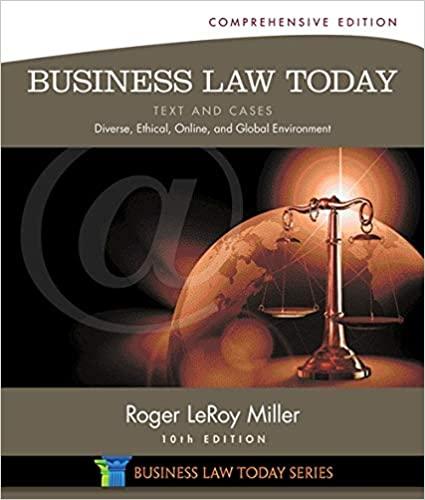Although there are more claims for breach of contract than for anyother category of lawsuits, the dollar
Question:
Although there are more claims for breach of contract than for anyother category of lawsuits, the dollar amount of damages awarded in tort actions is typically much higher than the awards in contract claims. Tort claims are also commonplace for businesses. Because of the potential for large damages awards for intentional and unintentional acts, businesspersons should take preventive measures to avoid tort liability as much as possible. Remember that injured persons can bring most tort actions against a business as well as against another person. In fact, if given a choice, plaintiffs often sue a business rather than an individual because the business is more likely to have “deep pockets” (the ability to pay large damages awards). Moreover, sometimes businesses can be held liable for torts that individuals cannot.
The Extent of Business Negligence Liability
A business can be exposed to negligence liability in a wide variety of instances. Liability to business invitees is a clear example. A business that fails to warn invitees that its floor is slippery after a rainstorm, or that its parking lot is icy after snow, may be liable to an injured customer. Indeed, business owners can be liable for nearly any fall or other injury that occurs on business premises.
Even the hiring of employees can lead to negligence liability. For example, a business can be liable if it fails to do a criminal background check before hiring a person to supervise a child-care center when an investigation would have revealed that the person had previously been convicted of sexual assault. Failure to properly supervise or instruct employees can also lead to liability for a business.
Liability for Torts of Employees and Agents
A business can also be held liable for the negligence or intentional torts of its employees and agents. As you will learn in Chapters 28–30 a business is liable for the torts committed by an employee who is acting within the scope of his or her employment or an agent who is acting with the authority of the business. Therefore, if a sales agent commits fraud while acting within the scope of her or his employment, the business will be held liable.
Question
1. Constantly inspect the premises and look for areas where customers or employees might trip, slide, or fall. Take corrective action whenever you find a problem.
2. Train employees on the importance of periodic safety inspections and the procedures for reporting unsafe conditions.
3. Routinely maintain all business equipment (including vehicles).
4. Check with your liability insurance company for suggestions on improving the safety of your premises and operations.
5. Make sure that your general liability policy will adequately cover the potential exposure of the business, and reassess your coverage annually.
6. Review the background and qualifications of individuals you are considering hiring as employees or agents.
7. Investigate and review all negligence claims promptly. Most claims can be settled at low cost before a lawsuit is filed.
Step by Step Answer:

Business Law Today Comprehensive Text And Cases Diverse Ethical Online And Global Environment
ISBN: 9781285428932
10th Edition
Authors: Roger LeRoy Miller





